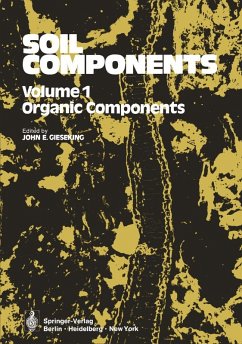
New Trends in Soil Micromorphology (eBook, PDF)
Versandkostenfrei!
Sofort per Download lieferbar
72,95 €
inkl. MwSt.
Weitere Ausgaben:

PAYBACK Punkte
36 °P sammeln!
The soil water retention curve, the saturated hydraulic conductivity and the unsaturated hydraulic conductivity function are basic soil hydraulic functions and parameters. Ample apprehension of the soil hydraulic functions and parameters is required for a successful formulation of the principles leading to sustainable soil management, agricultural production and environmental protection. From these, all the other parameters, required in the solution of the practical tasks, are derived. The basic soil hydraulic functions are strongly dependent upon the soil porous system. The development of mod...
The soil water retention curve, the saturated hydraulic conductivity and the unsaturated hydraulic conductivity function are basic soil hydraulic functions and parameters. Ample apprehension of the soil hydraulic functions and parameters is required for a successful formulation of the principles leading to sustainable soil management, agricultural production and environmental protection. From these, all the other parameters, required in the solution of the practical tasks, are derived. The basic soil hydraulic functions are strongly dependent upon the soil porous system. The development of models is characteristic by the gradual transition from the simplest concepts up to the sophisticated approaches, which should correspond to the visual reality studied by soil micromorphology. 2 Soil Porous System and Soil Micromorphometry 2.1 An Overview on the Quantification of the Soil Porous System Quanti? cation of the soil porous system consists of classi? cation of soil pores, ch- acterization of the soil pores shapes and the estimation of the pore size distribution function. When the hydraulic functions of the soil pores are considered, the following laws of hydrostatics and hydrodynamics are applied as best ? tting to the classi? cation criteria of the size of the pores (Kutilek and Nielsen 1994, p. 20, Kutilek 2004): A. Submicroscopic pores that are so small that they preclude clusters of water molecules from forming ? uid particles or continuous water ? ow paths.
Dieser Download kann aus rechtlichen Gründen nur mit Rechnungsadresse in A, B, BG, CY, CZ, D, DK, EW, E, FIN, F, GR, HR, H, IRL, I, LT, L, LR, M, NL, PL, P, R, S, SLO, SK ausgeliefert werden.












